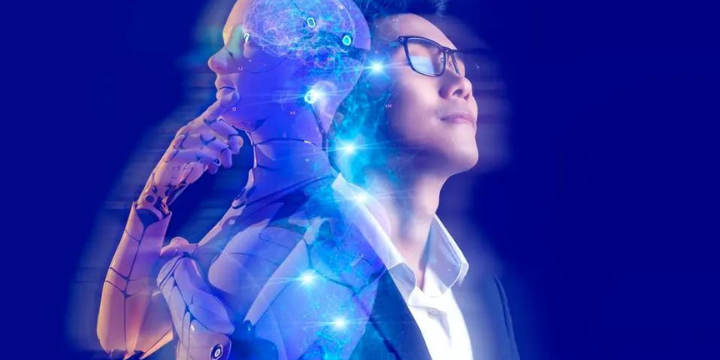Introduction
Role of Ai in Daily life, The development of artificial intelligence (AI) threatens to drastically change our planet as we stand on the verge of a technological revolution. The topic future of humans after artificial intelligence makes one both excited and worried. While some see a utopian society in which artificial intelligence improves all facets of human life, others worry about a dystopian future in which machines exceed human capacity and rule. Examining several facets of this future in light of the effects on jobs, ethics, social structures, and more, this paper As we explore these subjects, we will try to answer important concerns regarding the changing interaction between humans and artificial intelligence.
From Help to Autonomy: The Development of AI
The Present Situation of AI
From healthcare to finance, artificial intelligence has already achieved major advances in many different disciplines that change our way of life and business. AI systems help diagnose diseases, run cars, and even project market trends today. These developments, though, are only starting point. AI technology is predicted to move from a supporting to a more autonomous function as it develops, making independent decisions and completing difficult tasks free from human involvement.
Next Developments and AI’s Possibilities
AI systems that can not only recognize human emotions but also produce art, write novels, and participate in meaningful dialogues could be present in the next decades. This development begs the issue: When machines have skills that either equal or exceed human own, how will the future play out?
The Effect on Employment: a Two-Edged Sword
Employment Creation vs. Displacement
The way artificial intelligence is affecting employment raises one of the most important questions regarding its development. Automation and artificial intelligence run the danger of job displacement even if they can boost productivity and efficiency. Automation is threatening sectors including manufacturing, transportation, and even certain white-collar employment.
Still, it’s not entirely hopeless. Particularly in sectors connected to AI development, maintenance, and ethical governance, the arrival of artificial intelligence is also projected to generate fresh employment opportunities. Reskilling and up boarding the workforce to fit these new roles will prove difficult.
The Gig Economy and Freelance Prospectors
As artificial intelligence replaces labor-intensive tasks, gig and freelancing options could explode in the employment market. More humans might choose flexible schedules, concentrating on strategic and creative responsibilities that artificial intelligence cannot readily duplicate. This change might result in a more varied and vibrant employment market that gives people the liberty to follow creative ideas and passions.
Ethical Issues in the Human-Artificial Intelligence Relationship
Ethical questions surface when artificial intelligence systems grow increasingly self-contained. How can we guarantee that AI decisions are objective, open, and fair free from bias? After artificial intelligence, people’s futures will probably include creating strong ethical systems to direct AI actions. This covers defining norms for responsibility, data privacy, and permission.
AI’s Place in Human Life
The degree to which artificial intelligence should be included into daily life is yet another ethical issue. Will we let artificial intelligence decide in important spheres as law, medicine, or even personal relationships? The responses to these challenges will help to define the moral and social fabric of next civilizations.
Societal and Cultural Changes
The Development of AI-Driven Communities
Significant societal and cultural changes could result from artificial intelligence. Our interactions with technology and each other will change in a world when artificial intelligence can offer individualized education, healthcare, and entertainment. Communities might get increasingly globalized as artificial intelligence facilitates smooth communication and cooperation across boundaries.
Role of Ai in Daily life
Digital Divide and AI Access Although artificial intelligence promises numerous advantages, there is a chance to widen the digital divide. Not everyone will have equal access to artificial intelligence technologies, therefore differences in education, healthcare, and employment possibilities. To mold a fair and rich future, inclusive and fair access to artificial intelligence will be absolutely vital.
FAQs Regarding Human Future Following AI
1. Will artificial intelligence replace every human employment?
AI will generate new employment even if it might automate numerous chores. The secret will be to be flexible and reskilled for the changing employment environment.
2. Is artificial intelligence able to create human-like feelings?
Although artificial intelligence can replicate emotions and understand human emotions to some degree, real human emotions are complicated and closely linked to consciousness, something which AI lacks.
3. How can ethical growth of artificial intelligence be guaranteed?
To avoid prejudice and guarantee responsibility, developing ethical artificial intelligence calls for open algorithms, varied training data, and strong legal systems.
4. Will artificial intelligence cause a loss of human innovation?
By managing monotonous chores, artificial intelligence can boost human creativity and free them to concentrate on original and artistic activities. It might also work creatively alongside people.
5. In including artificial intelligence into society, what is the toughest obstacle?
Dealing with the ethical, societal, and financial effects of artificial intelligence is among the toughest tasks ahead. Important issues are guaranteeing fair access and eliminating abuse.
conclusion
Human futures following artificial intelligence present great possibilities as well as difficulties. We have to strike a balance between ethical issues and society effects as we negotiate this new era against the advantages of artificial intelligence. In the future, people and artificial intelligence will probably live in harmony where technology raises human capacity and quality of life. To reach this ambition, though, will call for rigorous planning, control, and a dedication to inclusiveness. Though the road ahead is unknown, one thing is certain: the combination of artificial intelligence and human creativity will transform the planet in ways we can only start to dream of.

